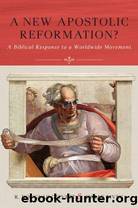A New Apostolic Reformation?: A Biblical Response to a Worldwide Movement by R. Douglas Geivett & Holly Pivec

Author:R. Douglas Geivett & Holly Pivec [Geivett, R. Douglas & Pivec, Holly]
Language: eng
Format: epub
Tags: IW
Publisher: Weaver Book Company
Published: 2014-11-13T17:00:00+00:00
The Orthodoxy Test
Another test Scripture gives for prophets is the orthodoxy test, which requires that prophets’ words must line up with the revelation already given. This test is spelled out in Deuteronomy 13:1–5:
If a prophet or a dreamer of dreams arises among you and gives you a sign or a wonder, and the sign or wonder that he tells you comes to pass, and if he says, “Let us go after other gods,” which you have not known, “and let us serve them,” you shall not listen to the words of that prophet or that dreamer of dreams. For the Lord your God is testing you, to know whether you love the Lord your God with all your heart and with all your soul. You shall walk after the Lord your God and fear him and keep his commandments and obey his voice, and you shall serve him and hold fast to him. But that prophet or that dreamer of dreams shall be put to death, because he has taught rebellion against the Lord your God, who brought you out of the land of Egypt and redeemed you out of the house of slavery, to make you leave the way in which the Lord your God commanded you to walk. So you shall purge the evil from your midst.
The orthodoxy test shows up again in the New Testament, where we see that all teachings in the churches—including teachings given by prophets—were held to the standard of teaching that had been handed down by the apostles of Christ. Consider, for example, the teaching that circulated in the church at Thessalonica that the day of the Lord had already arrived. This teaching had come, possibly, through the revelation of a false prophet (“by a spirit,” 2 Thess. 2:2). The apostle Paul countered it by reminding the Thessalonians what he had already taught them—that the day of the Lord wouldn’t occur until other events took place first (2 Thess. 2:3–5).
Elsewhere, Paul urged his protégé Timothy to take the teachings he had learned from Paul—the apostolic teachings—and “entrust [them] to faithful men who will be able to teach others also” (2 Tim. 2:2). Note that Paul didn’t tell Timothy to expect and rely on new truths from prophets. He instructed Timothy to recall truths already revealed through the apostles of Christ.
NAR leaders profess agreement with the orthodoxy test. They claim prophets’ teachings must line up with Scripture. But our assessment has shown that many of their teachings do not line up.
Furthermore, many NAR leaders continue to esteem Latter Rain prophets who have promoted aberrant and even heretical teachings, including William Branham (1905–1965). The prophet Branham taught that Eve had sexual relations with the serpent (the so-called serpent seed doctrine) and that those who are descended from the serpent seed are destined for a non-eternal hell, while those who receive Branham’s teachings are predestined to become the “bride of Christ.” He also denied the doctrine of the Trinity.377 These particular teachings of Branham are overlooked since he was known to have an unparalleled ministry of miracles.
Download
This site does not store any files on its server. We only index and link to content provided by other sites. Please contact the content providers to delete copyright contents if any and email us, we'll remove relevant links or contents immediately.
| Anglican | Baptist |
| Book of Common Prayer | Calvinist |
| Episcopalian | Inspirational |
| Lutheran | Methodist |
| Pentecostal & Charismatic | Presbyterian |
| Quaker | Seventh-Day Adventist |
| Shaker | Theology |
Angels by Billy Graham(1549)
How To Be Born Again by Billy Graham(1404)
Peace with God by Billy Graham(1319)
Unbroken Curses by Rebecca Brown & Daniel Yoder(1180)
God's Prophetic Symbolism in Everyday Life by Adam Thompson & Adrian Beale(1130)
The School of Biblical Evangelism by Ray Comfort(1100)
Martin Luther: The Man Who Rediscovered God and Changed the World by Eric Metaxas(1090)
Power over the Enemy by John Osteen & Joel Osteen(1076)
Call by Rick Joyner(1056)
Jonathan Edwards: A Life by Marsden George M(955)
The Supernatural Power of a Transformed Mind Expanded Edition: Access to a Life of Miracles by Bill Johnson(947)
Unmasking the Devil: Strategies to Defeat Eternity's Greatest Enemy by John Ramirez(925)
Prayers That Bring Healing and Activate Blessings: Experience the Protection, Power, and Favor of God by John Eckhardt(920)
Fresh Wind, Fresh Fire by Jim Cymbala(913)
An Altar in the World by Barbara Brown Taylor(903)
Reformation Theology by Littlejohn Bradford(887)
Liturgy of the Ordinary by Tish Harrison Warren(879)
Seeing the Voice of God: What God Is Telling You through Dreams and Visions by Smith Laura Harris(873)
Martin Luther by Mansch Larry D.; Peters Curtis H.;(859)
